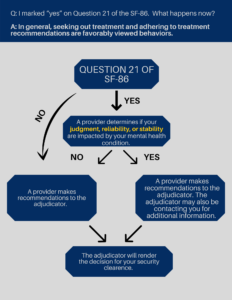Mason students may need to obtain security clearances for work with federal agencies and government contractors. Security clearances are a routine part of federal work involving national security, intelligence, law enforcement, and foreign service. As explained below, the use of counseling services and other psychological services does not preclude a Mason student from obtaining a security clearance.
Common Myths
Myth: If I go to see a mental health provider, I will lose or be denied my security clearance.Fact: Actively seeking professional care for mental health issues does NOT jeopardize eligibility for a security clearance.
- The Questionnaire for National Security Positions (SF-86) only asks about aspects of mental health related to judgment, reliability, and stability. The form asks whether one has been:
-
- Declared mentally incompetent by a court or ordered to see a mental health professional;
- Hospitalized for a mental health condition;
- Diagnosed with a psychotic disorder, bipolar disorder, or certain personality disorders; or
- Impacted by a mental health condition, such that it substantially and adversely impacts your judgment, reliability, or trustworthiness.
- Between 2006-2012, significantly less than 1% (145 of 85,000 cases) had security clearances denied or revoked due to mental health reasons alone.
- In FY 2014, 18 individuals had security clearances denied or revoked due to psychological issues; none were solely because they sought mental health services.
Fact: The mental health evaluation is part of the data gathered across the investigative process. Mental health providers serve as consultants and provide recommendations; they do not have decision-making authority. Instead, decisions are rendered by the adjudicators at the Department of Defense Consolidated Adjudications Facility (DoD CAF).
Frequently Asked Questions
I’m noticing things have been “off” for me lately. Should I go see someone?Studies suggest seeking treatment shortly after the onset of symptoms is less likely to have negative career impacts than seeking treatment later on. By self-referring for treatment, this may help prevent a “command-referral.” For members of the U.S. Military, there are fewer duty limitations and provider disclosures to commanders if you self-refer for care.
No. Security managers, commanders, and supervisors are NOT authorized to ask you questions about mental health counseling that you have reported on the SF-86. Any unauthorized questioning can be reported to the DoD IG Hotline at 1-800-424-9098.
- Mason has a Clearance Ready Program that helps Mason students prepare to obtain a security clearance.
- USAjobs.gov provides more information about security clearances and background checks for federal service.
- Eligibility for military service is governed by the U.S. Department of Defense’s Medical Standard for Appointment, Enlistment, or Induction into the Military Services. These standards apply before service begins and do not determine whether a service member obtains or maintains a security clearance.
View our informational flyer here: Security Clearance and Behavioral Health.

